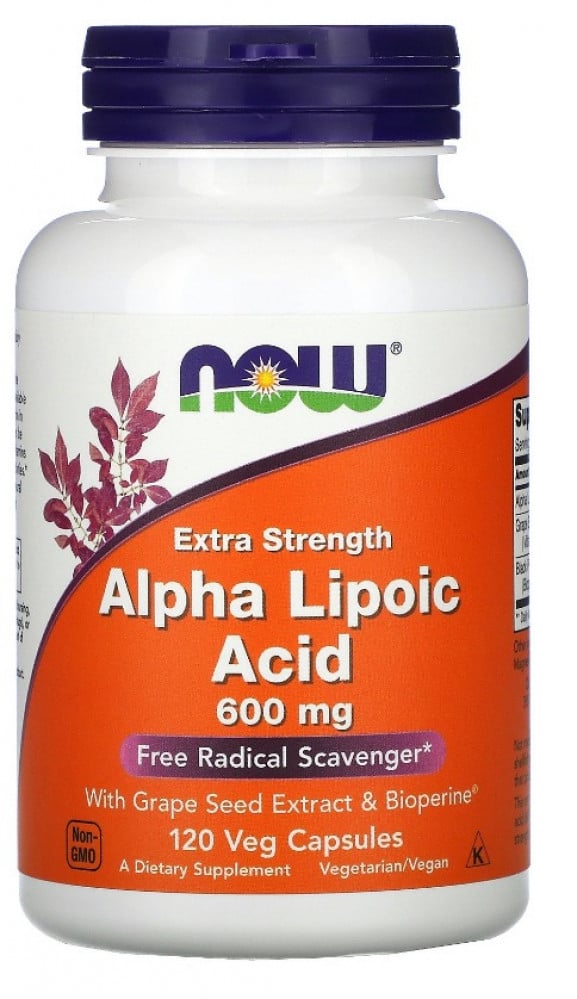
Alpha lipoic acid
What is alpha lipoic?
A vitamin-like chemical called an antioxidant. Yeast, liver, kidneys, spinach, broccoli and potatoes are good sources of alpha-lipoic acid.
The main functions of alpha lipoic acid
- Alpha Lipoic Acid is necessary for the manufacture of adenosine triphosphate (ATP)
- Alpha Lipoic Acid acts as an important cellular antioxidant
- ALA helps reduce markers of inflammation
Among the benefits of alpha lipoic acid are:
diabetes
- Alpha Lipoic Acid helps control blood glucose metabolism
- It increases insulin sensitivity, and thus can contribute to the treatment of insulin resistance.
- Reduces cumulative sugar.
- Helps protect against diabetic retinopathy.
- It also reduces the chances of diabetes complications such as heart disease, eye and kidney disease.
- It is used only with the approval of the attending physician in order to avoid possible drug interactions.
Inflammation of the nerves
- The use of alpha lipoic acid helps reduce inflammation in general such as rheumatoid arthritis.
- It works to reduce peripheral nerve inflammation and diabetic neuritis associated with diabetes.
- Helps reduce oxidative stress and fight free radicals.
- Reduces the risk of heart disease, lowering the level of triglycerides and bad cholesterol
- It enhances the function of nerves and neurons, and speeds up the healing process.
Obesity and overweight
- Alpha lipoic acid is used for weight loss, as it was found to have the ability to reduce the feeling of hunger.
- It can increase the number of calories the body burns at rest.
- It was found that the final effect of alpha lipoic acid is very small in reducing weight.
Memory loss treatment
- Alpha lipoic acid is a powerful antioxidant and works to reduce oxidative stress.
- Helps in the process of slowing down memory loss for the elderly.
- There are not enough studies yet to use it in the treatment of Alzheimer's disease.
Benefits of alpha lipoic acid for the skin
The use of alpha lipoic acid helps maintain the freshness and vitality of the skin and is effective in protecting against harmful sunlight
- Alpha lipoic acid is used for skin because of its ability to treat rough skin and reduce skin wrinkles.
- It was found to be effective in slowing down the skin aging process and treating fine lines.
- It is effective in treating sun damaged skin when using skin products containing alpha lipoic acid.
- Contributes to increasing the effectiveness of ultraviolet rays used to treat vitiligo.
- It increases the effectiveness of other antioxidants such as vitamin C. Alpha lipoic acid benefits for the skin.
Side effects of alpha lipoic acid
Alpha lipoic acid is safe when used in pill or ointment form, but it can cause some side effects, such as:
sweating
confusion.
fast heartbeat
Headache.
Numbness, muscle spasm.
Nausea.
rash, itching;
Low blood glucose level.
Change in the level of thyroid hormones.
Sources of Alpha Lipoic Acid
Alpha lipoic acid is one of the compounds that are found naturally in many foods, such as the following foods:
- Red meat
- Organ meats such as liver, heart, kidneys, etc
- broccoli
- tomatoes
- spinach
- rice bran
- Brussels sprouts
- potatoes
- Green Peas
Alpha Lipoic Acid can also be found in supplement form in many health stores and online, and dietary supplements can contain up to 1,000 times more Alpha Lipoic Acid than foods that naturally contain it.
How do I know if I have an alpha lipoic acid deficiency?
Alpha lipoic acid deficiency is very rare and almost unheard of in the medical community until now, but rare genetic mutations can cause a defect in the manufacture of lipoic acid, and it is estimated that less than one person in every million people has this disease, so there is no need to worry about the occurrence of alpha lipoic acid deficiency Because the body makes it naturally in the body.

